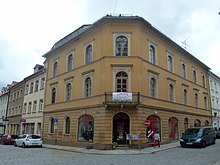Hermann Unger
Gustav Hermann Unger (born October 26, 1886 in Kamenz , † December 31, 1958 in Cologne ) was a German composer .
Life
Hermann Unger was the son of the traveling theater director Fritz Unger (1858–1922) and his wife Maria nee Stein. He was born at Klosterstrasse 1 in Kamenz. Unger attended the Fürstenschule Grimma and studied German, archeology, musicology and classical philology at the universities of Freiburg , Leipzig and Munich . He received musical training from Edgar Istel and Joseph Haas while studying in Munich . The latter put him in 1911 at Max Reger in Meiningen . Unger did his military service in Meiningen with the regimental music. In 1910 Unger received his doctorate from Otto Crusius in Munich. phil. with a work on the use of the dactylic hexameter in Old Attic comedy .
In 1913 Unger came to Cologne as editor of the Rheinische Musik- und Theater-Zeitung . During the First World War , he first came to Champagne . Thereafter Unger was transferred to the theaters of war of the Ottoman Empire and served in Aleppo and Constantinople . After returning via Russia in 1918/1919, he headed the Cologne Municipal Library and gave lectures at the University of Cologne . In 1919 Unger married the widow of the medical officer Alexander Burger, Leonie geb. Debut (1894–1970). The son Klaus (1920–2012) emerged from the marriage.
From 1927 Unger was a professor at the music school in Cologne, which since the reform in 1925 has been part of a state university for music (master classes for instrumental playing and singing, composition, music theory, music history, rhythm, opera school, and the departments for Protestant and Catholic church music as well as school music ) and the municipal Rheinische Musikschule (preparatory classes for the orchestral school, the opera choir school and classes for amateur and youth music) with separate statutes and examination regulations. After the National Socialists came to power, the university director Walter Braunfels was dismissed. The director of the music school, Hermann Abendroth , was also expelled from his position a year later. In 1935, Martin Karl Hasse took over the management of the university. Hermann Unger was appointed director of the Rheinische Musikschule and Hasse's deputy.
Although Unger was still a journalist polemic against the accumulation of offices and mismanagement in Cologne before 1933, after the seizure of power he took 16 positions close to the system. The main denazification committee of the city of Cologne therefore classified Unger in January 1949 in category IV (followers) without freezing accounts and assets. Nevertheless, there were numerous public events on Unger's seventieth birthday. Even his hometown Kamenz, which is now part of the Eastern Bloc , organized a gala concert in 1956 in the Stadt Dresden restaurant, as it did in 1936, under the musical direction of the Kamenz music director Höhne. The performances included the works Niederrheinische Tänze und Lieder (Op. 100) and Schönsteiner Schlossmusik ( Suite in five movements in medieval ways; Op. 105), both composed for chamber orchestra. The required notes and documents were personally sent to Kamenz by Unger, who was delighted with the award.
The Association of German Tonkünstler und Musiklehrer (VDTM) proposed several times that Unger be awarded the Federal Cross of Merit , First Class, initially around a month before Unger's seventieth birthday. The Ministry of Culture of North Rhine-Westphalia rejected this several times. Only after a letter sent directly to the Minister of Education and Cultural Affairs, Paul Luchtenberg , at the end of 1957, he decided to award the medal, but this was not until shortly before Unger's death by Luchtenberg's predecessor and successor Werner Schütz on “5. December 1958 around 7:00 p.m. ”took place in Unger's apartment without notifying the press. In January 1959, Schütz had to comment in detail on the circumstances of the award of the medal.
On December 31, 1958, Unger died at the age of 72 in his apartment in Cologne-Bayenthal . The grave of the Unger family is in Cologne's southern cemetery (hall 43).
Honors
- Iron Cross 2nd and 1st class
- Iron crescent
- Hanseatic Cross
- Federal Cross of Merit 1st class
Works (selection)
- Pictures from the Orient: op.17
- Levantine Rondo: op.22
- Hymn to Life: op.25 (text by Émile Verhaeren )
- Seasons: op. 26 (first performance in Berlin and Leipzig by Arthur Nikisch )
- Richmodis von Aducht: op. 50, Legenden Volksoper in one prelude and three acts
- Small fugue (third-sixth study) op.129
Individual evidence
- ↑ a b Death certificate no. 10 from January 2, 1959, registry office Cologne old town. In: LAV NRW R civil status register. Retrieved July 15, 2018 .
- ↑ a b c d e f g h Norbert Portmann: Kamenz and his famous sons - Kamenz is more than Lessing. Part I. Norbert Portmann, Kamenz 2012.
- ↑ a b c d e f g h i Michael Custodis : Denazification at the Cologne Music Academy using the example of Walter Trienes and Hermann Unger. Pages 61–83 in: Albrecht Riethmüller (Ed.): Deutsche Leitkultur Musik? Franz Steiner, Stuttgart 2006. ISBN 978-3-515-08974-6 .
- ↑ a b Dietmar von Capitaine: Conservatorium der Musik in Cöln. Books on Demand, Norderstedt 2009. ISBN 978-3-8370-5294-7 .
- ↑ a b Heinrich Lindlar (1956): Hermann Unger 70 years. Musica (Kassel) 10: 713-714.
- ↑ Hermann Unger: Investigations on the Altattic Comedy: I. The use of the dactylic hexameter. Noske, Borna-Leipzig 1911.
- ^ Heinrich Lindlar (ed.): 130 years of the Rheinische Musikschule Köln: legacy and order. Rheinische Musikschule, Cologne 1975.
| personal data | |
|---|---|
| SURNAME | Unger, Hermann |
| ALTERNATIVE NAMES | Unger, Gustav Hermann (full name) |
| BRIEF DESCRIPTION | German composer |
| DATE OF BIRTH | October 26, 1886 |
| PLACE OF BIRTH | Kamenz |
| DATE OF DEATH | December 31, 1958 |
| Place of death | Cologne |

